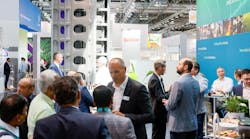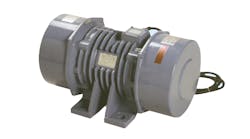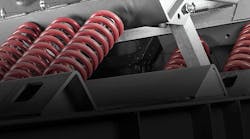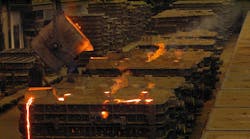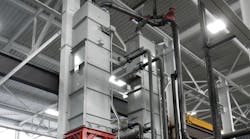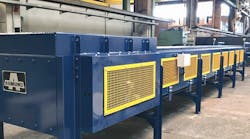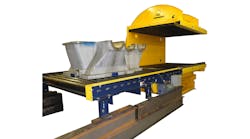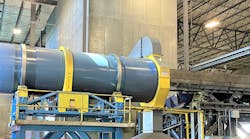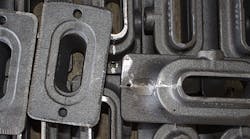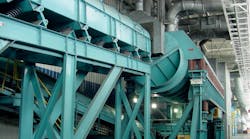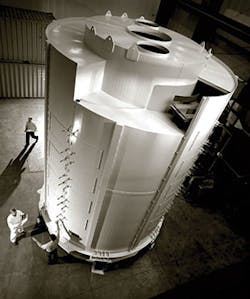There is much discussion among metalcasters, specifically in recent months, about the new U.S. EPA’s new silica regulations and how to keep operators away from foundries’ noisy, dusty, and hot environments. This is a big challenge, especially for steel and iron foundries, due to the extreme heat and abrasive conditions in the workplace. Educational resources are being developed, but many questions remain as to whether any changes will be economically feasible or even meet the Permissible Exposure Limits (PEL.)
While these PEL requirements are not fully implemented until Spring 2018, General Kinematics has been involved in many preliminary discussions as how to address these issues, particularly in foundries’ cleaning rooms. This is where most improvements must be made. As hot castings cool and are cleaned, sand is removed that enters the air thus increasing silica exposure risks. How can GK engineer and manufacture safer as well as more ergonomically friendly, less labor-intensive processes for cleaning rooms?
Most foundries will be working to address this issue with constraints to existing installations, buildings and layouts requiring an extremely thoughtful engineered approach to a system that works. Space and elevation are a premium, but it is possible to design ideal arrangements that meet the new PEL standards.
Castings need to be cleaned, cooled, and noise needs to be contained, before operators see the castings. First, current GK equipment like the Vibra-Drum® sand and casting conditioner and the Spira-Cool® casting cooling conveyor are inherently closed-system designs, thereby eliminating airborne silica particles. By containing the castings within these gentle shakeout and cooling units, workers are not even exposed to potential hazards.
Second, by working harder in the pre-blast process, foundries can take more silica away from the castings before they enter the inspection and material handling sequences.
Last, foundries can protect workers by installing manipulators for sorting and degating operations, removing the operator from hot casting exposure, and localizing the dust control. GK provides vibratory conveyors in both the pre-blast process and sorting and degating operations that are low maintenance and highly reliable.
An ideal process approach involves cleaning, cooling and reducing noise prior to operators coming into contact with the castings, while eliminating airborne silica particles. A closed system design such as the General Kinematics Vibra-Drum® sand and casting conditioner is inherently safer, because it reduces the overall possibility of airborne silica particles. By containing the castings within this gentle shakeout and cooler unit, workers are not exposed to potential hazards. As a result, workers are kept safe and production levels are maintained.
When using the GK Vibra-Drum, not only is enclosure of potential hazards accomplished, a continuous process is achieved. Castings are gently tumbled and accelerated cooling occurs by way of equalizing of sand/casting temperatures and evaporation of moisture. Unlike other shakeout technology, castings are gently blended – never dropping or creating impact during the process. This action provides the gentlest shakeout in the industry, ideal for both rugged and fragile castings, which are a notable hazard because they must be handled by workers in order to reduce the risk of damage to finished pieces.
The Vibra-Drum is an easy-to-maintain, non-rotating design with all the environmental benefits of a fully enclosed drum, concentrating the ventilation and air handling to a single location.
According to AFS' Control of Silica Exposure in Foundries, about 25% of all incidences of airborne-silica exposure “directly involves material handling of silica-bearing materials”. Silica becomes hazardous when it is airborne. Typically abrasive processes that fracture particles, like those found in the foundry cleaning room, generate respirable dust. Dust can also occur during the handling, cooling, and transport of castings from one process area to the next.
In foundries where floor space is limited, the General Kinematics Spira-Cool casting cooling spiral allows castings to gain elevation through vibration. While in the enclosed spiral, gentle vibratory motion is combined with controlled cooling, dust collection, and noise reduction. The closed system design contains and centrally collects airborne silica particles, ensuring workers are not exposed to them.
General Kinematics engineers design each spiral to the specific application and requirements of individual foundries. Many things are taken into account in the spiral design, including the casting sizes, section modulus, cooling rate, metal type, and sprue configuration. Residual sand is collected at multiple locations and returned to the sand system.
The patented air chamber design of the Spira-Cool contains all ductwork in a single location, reducing ventilation costs and quickly cooling castings with a high velocity, nozzle system. The air stream is designed with a patented dropout box, reducing the emission of fines to your dust collection system.
Regulatory change is coming, and with that employee exposure to silica must be controlled to unprecedented levels. The Permissible Exposure Limits are the new measurement by which compliance will be judged, and equipment manufacturers specializing in foundry processes have a responsibility to provide solutions that meet the new regulatory standards.
Claude Hutchens is the director of marketing and international sales, and Amy Donahue-Kelley is the global marketing manager, for General Kinematics Corp. Learn more at www.generalkinematics.com
